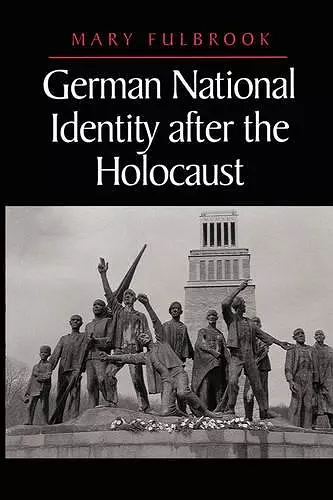German National Identity after the Holocaust
Format:Paperback
Publisher:John Wiley and Sons Ltd
Published:11th Jun '99
Currently unavailable, and unfortunately no date known when it will be back

For over half a century, Germans have lived in the shadow of Auschwitz. Who was responsible for the mass murder of millions of people in the Holocaust: just a small gang of evil men, Hitler and his henchmen; or certain groups within a particular system; or even the whole nation? Could the roots of malignancy be traced far back in German history? Or did the Holocaust have more to do with European modernity? Should Germans live with a legacy of guilt forever? And how, if at all, could an acceptable German national identity be defined?
These questions dogged public debates in both East and West Germany in the long period of division. Both states officially claimed to have "overcome the past" more effectively than the other; both sought to construct new, opposing identities as the "better Germany". But, in different ways, official claims ran at odds with the kaleidoscope of popular collective memories; dissonances, sensitivities and taboos were the order of the day on both sides of the Wall. And in the 1990s, with continued heated debates over past and present, it was clear that inner unity appeared to be no automatic consequence of formal unification.
Drawing on a wide range of material - from landscapes of memory and rituals of commemoration, through private diaries, oral history interviews and public opinion poll surveys, to the speeches of politicians and the writings of professional historians - Fulbrook provides a clear analysis of key controversies, events and patterns of historical and national consciousness in East and West Germany in equal depth.
Arguing against "essentialist" conceptions of the nation, Fulbrook presents a theory of the nation as a constructed community of shared legacy and common destiny, and shows how the conditions for the easy construction of any such identity have been notably lacking in Germany after the Holocaust.
This book will be of interest to advanced undergraduate and postgraduate students in history, politics, and German and European Studies, as well as established scholars and interested members of the public.
'Mary Fulbrook displays a rare capacity for clear and sober thinking about a complex and emotive subject. Her analyses of academic, political and private ways of understanding the past in post-1945 Germany are illuminating. Ideas of fixed national identity are revealed as constructs which serve to create satisfying links between imagined past, troubled present and uncertain future.' John Breuilly, University of Birmingham
'This is a remarkable book, resting on historical scholarship of the highest order, rich in ideas and highly nuanced in approach.' Journal of European Area Studies
'An expert dissection of German national identity since 1945, and the role that historians have played in its formation, deformation and reformation ... Fulbrook writes with wit about the East German leadership's forlorn efforts to manufacture a supportive past ... She is sceptical of grand notions about collective memory, preferring to identify micro-communities each with its own sense of the past. Here the divergence between the official and the vernacular discourse of memory is starkest, a gulf that Fulbrook can illustrate thanks to her unrivalled knowledge of East German social history.' David Cesarani, The Times Higher Education Supplement
'In her discussion of these issues Fulbrook displays her enviable capacity for rendering complex ideas in an easily accessible form. Indeed, this accessibility, combined with Fulbrook's ability to summarize and reflect upon the pre-existing literature in such judicious fashion, is the chief strength of this book as a whole.' German History
'Despite the complexity of the subject, Fulbrook succeeds in presenting a clear and fascinating account of national identity formation in the two German states after 1950, exploring new avenues of thought and combining public and private views of the past and its consequences for the present to create a new approach to our dealings with the question of national identity.' European Review of History
'Fulbrook's achievement is to bring out both individual experience and the importance of historical contingency in examining questions of national identity. Above all, the book suceeds in drawing together stark first-hand accounts, by both perpetrators and victims, of life and death in a concentration camp, with their subsequent recontextualizing within the discourses of shame and blame in the two post-war Germanys.' Patterns of Prejudice
'All three groups of intended readers - students, established scholars, and interested members of the public - should find this book rewarding, stimulting, and at times controversial reading. The overall analysis is persuasive, judicious, and marked by considerable empathy.' Canadian Journal of History
'Fulbrook's tour de force is an informative read for anyone who wishes to educate themselves authoritatively about the "German debates" of the last decade.' Journal of Contemporary Histor
ISBN: 9780745610450
Dimensions: 229mm x 154mm x 19mm
Weight: 397g
256 pages